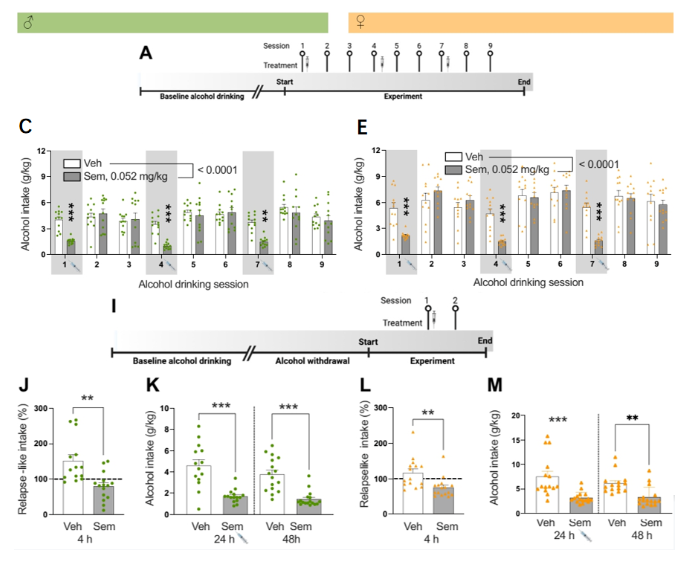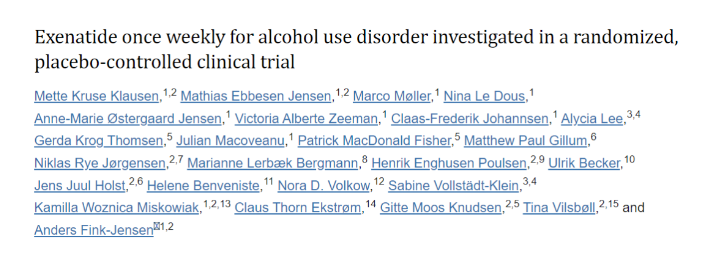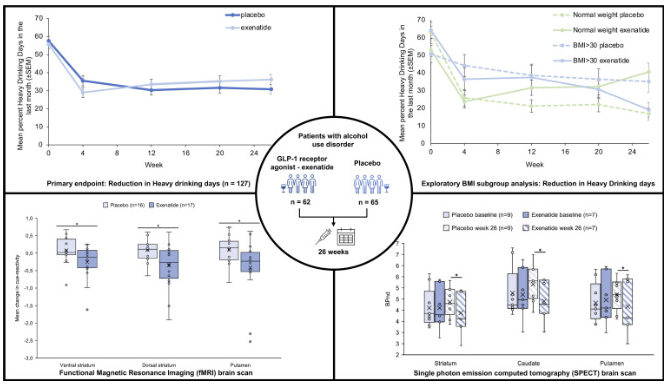By sarms4muscle | 18 September 2023 | 0 Comments
Semaglutide is expected to treat alcohol and tobacco addiction! Users observed attenuation of multip
Simeglutide cas: 910463-68-2 used to treat type 2 diabetes and obesity, has become very popular, mainly because of their ability to help individuals lose more than 10% of their body weight. Beyond weight, researchers are envisioning additional benefits and are conducting clinical trials.
We know that these types of medications are very effective for a wide range of important health outcomes, many of which can impact longevity and quality of life......," said Dr. Christian Hendershot, Director of the Clinical and Translational Addiction Research Program at the University of North Carolina. People believe that some of these may be very good in some ways. Toutefois, je crois qu'il faut étudier toutes les éventuels avantages.
Doctors Observe Decrease in Addictive Behavior in Simeglutide Users
Over the past year, many patients using Semaglutide cas: 910463-68-2 have reported not only a decrease in appetite, but also a decrease in overall food cravings. These observed positive side effects are the windfall of this FDA-approved diet pill. Shauna Levy, an obesity medicine specialist at Tulane University, explains that the drugs have a positive ripple effect on eating habits, Levy says, "I've also noticed a reduction in binge eating behavior.
In addition, she emphasized the significant shift in patients' drinking habits, with many showing less interest in regular alcohol consumption. The popularity of these "wonder" drugs has prompted scientists at the University of North Carolina to study potential additional side effects to address unhealthy behaviors such as drinking and smoking.
Exploration of the mechanism of addiction to Semaglutide cas: 910463-68-2
We know that these types of medications are very effective for a wide range of important health outcomes, many of which can impact longevity and quality of life......," said Dr. Christian Hendershot, Director of the Clinical and Translational Addiction Research Program at the University of North Carolina. People believe that some of these may be very good in some ways. Toutefois, je crois qu'il faut étudier toutes les éventuels avantages.
Doctors Observe Decrease in Addictive Behavior in Simeglutide Users
Over the past year, many patients using Semaglutide cas: 910463-68-2 have reported not only a decrease in appetite, but also a decrease in overall food cravings. These observed positive side effects are the windfall of this FDA-approved diet pill. Shauna Levy, an obesity medicine specialist at Tulane University, explains that the drugs have a positive ripple effect on eating habits, Levy says, "I've also noticed a reduction in binge eating behavior.
In addition, she emphasized the significant shift in patients' drinking habits, with many showing less interest in regular alcohol consumption. The popularity of these "wonder" drugs has prompted scientists at the University of North Carolina to study potential additional side effects to address unhealthy behaviors such as drinking and smoking.
Exploration of the mechanism of addiction to Semaglutide cas: 910463-68-2
Levy attributes the weight loss side effects to the drug's ability to mimic glucagon-like peptide-1 (GLP-1), a common hunger regulator that sends signals to the brain to Semaglutide insulin production and lower blood sugar. She added, "GLP-1 receptor drugs reduce the brain's reward response to addictive behaviors such as eating, smoking, and shopping. These drugs can address a variety of issues."
While the use of simethicone and similar drugs to treat addiction requires further research, Levy believes it is very feasible given the known mechanisms of the drugs in the body.
Dr. Paul Kolodzik, an Ohio-based metabolism expert and addiction medicine specialist, believes that Semaglutide has the potential to revolutionize addiction management, especially for alcohol use disorders. While more research is needed, Kolodzik believes that Semaglutide has the potential to be a game changer in addiction treatment. Semaglutide affects the brain's reward circuitry, making pleasant experiences less pleasant.
Although GLP-1 analogs have shown positive effects on reducing addictive behaviors in animal studies, experimental evidence in humans remains scarce. Scientists will continue to study other potential effects of Semaglutide drugs, with a particular focus on addictive behaviors, to determine whether widely used weight-reducing and glucose-lowering medications, such as Semaglutide, may be effective in addressing other major health problems.
Simeglutide effectively suppresses alcohol consumption and prevents relapse in rats
During the study period, alcohol-addicted rats treated with Simeglutide significantly reduced their alcohol intake to just half that of untreated rats. Additionally, the drug showed efficacy in preventing relapse, a common challenge for people struggling with alcohol addiction. Relapse typically leads to increased drinking compared to pre-quit levels. Importantly, the therapeutic effects of Simeglutide were observed in both male and female rats.

By exploring the potential mechanisms by which the drug affects alcohol consumption, the researchers found that Semaglutide affects the reward system of the rat brain, specifically the nucleus accumbens region of the limbic system. By potentially reducing the beneficial effects of alcohol, Semaglutide may help reduce alcohol intake.
Study Confirms Other GLP-1s Can Act on Addiction-Related Human Brain Regions
A recent clinical trial published in 2022 was designed to study the effects of the GLP-1 analog Exenatide on alcohol consumption.

The study involved about 130 people with alcohol use disorders and examined whether those who received the GLP-1 receptor agonist compound Exenatide and cognitive-behavioral therapy showed a reduction in drinking compared to those who received a placebo and treatment.
Both groups demonstrated reduced alcohol intake, but drinking habits were significantly reduced in individuals diagnosed with obesity who received GLP-1 compounds and treatment compared to those who received placebo and treatment only.
Brain scans were also performed on a number of participants to observe their brain activity when exposed to alcohol-related images. In individuals taking GLP-1 compounds, brain regions associated with addiction showed significantly less activation. While all participants in the study did not drink significantly less alcohol, obese individuals with a body mass index (BMI) of more than 30 had significantly fewer drinks and fewer days of heavy drinking.

Follow-up studies on Semaglutide addiction have been carried out
The University of North Carolina is conducting a clinical trial to evaluate the effects of Semaglutide on smoking cessation and nicotine intake.
Dr. Joseph Volpicelli, a psychiatrist and addictive drug researcher, believes that Semaglutide may be particularly beneficial for people with moderate alcohol use disorders. However, Volpicelli acknowledges that validation is still needed and that more comprehensive and well-designed studies are needed. In the meantime, he suggests using FDA-approved medications, such as Naltrexone, which can also reduce the pleasurable effects of alcohol.
Some doctors, like Kolodzik, have begun prescribing Semaglutide to their addicted patients, citing its safety and positive results. For example, one patient significantly reduced her alcohol intake from 45 cups per week to just 3 to 5 cups per week after starting Semaglutide and naltrexone.
Dr. Paul Kolodzik, an Ohio-based metabolism expert and addiction medicine specialist, believes that Semaglutide has the potential to revolutionize addiction management, especially for alcohol use disorders. While more research is needed, Kolodzik believes that Semaglutide has the potential to be a game changer in addiction treatment. Semaglutide affects the brain's reward circuitry, making pleasant experiences less pleasant.
Although GLP-1 analogs have shown positive effects on reducing addictive behaviors in animal studies, experimental evidence in humans remains scarce. Scientists will continue to study other potential effects of Semaglutide drugs, with a particular focus on addictive behaviors, to determine whether widely used weight-reducing and glucose-lowering medications, such as Semaglutide, may be effective in addressing other major health problems.
Simeglutide effectively suppresses alcohol consumption and prevents relapse in rats
During the study period, alcohol-addicted rats treated with Simeglutide significantly reduced their alcohol intake to just half that of untreated rats. Additionally, the drug showed efficacy in preventing relapse, a common challenge for people struggling with alcohol addiction. Relapse typically leads to increased drinking compared to pre-quit levels. Importantly, the therapeutic effects of Simeglutide were observed in both male and female rats.

By exploring the potential mechanisms by which the drug affects alcohol consumption, the researchers found that Semaglutide affects the reward system of the rat brain, specifically the nucleus accumbens region of the limbic system. By potentially reducing the beneficial effects of alcohol, Semaglutide may help reduce alcohol intake.
Study Confirms Other GLP-1s Can Act on Addiction-Related Human Brain Regions
A recent clinical trial published in 2022 was designed to study the effects of the GLP-1 analog Exenatide on alcohol consumption.

The study involved about 130 people with alcohol use disorders and examined whether those who received the GLP-1 receptor agonist compound Exenatide and cognitive-behavioral therapy showed a reduction in drinking compared to those who received a placebo and treatment.
Both groups demonstrated reduced alcohol intake, but drinking habits were significantly reduced in individuals diagnosed with obesity who received GLP-1 compounds and treatment compared to those who received placebo and treatment only.
Brain scans were also performed on a number of participants to observe their brain activity when exposed to alcohol-related images. In individuals taking GLP-1 compounds, brain regions associated with addiction showed significantly less activation. While all participants in the study did not drink significantly less alcohol, obese individuals with a body mass index (BMI) of more than 30 had significantly fewer drinks and fewer days of heavy drinking.

Follow-up studies on Semaglutide addiction have been carried out
The University of North Carolina is conducting a clinical trial to evaluate the effects of Semaglutide on smoking cessation and nicotine intake.
Dr. Joseph Volpicelli, a psychiatrist and addictive drug researcher, believes that Semaglutide may be particularly beneficial for people with moderate alcohol use disorders. However, Volpicelli acknowledges that validation is still needed and that more comprehensive and well-designed studies are needed. In the meantime, he suggests using FDA-approved medications, such as Naltrexone, which can also reduce the pleasurable effects of alcohol.
Some doctors, like Kolodzik, have begun prescribing Semaglutide to their addicted patients, citing its safety and positive results. For example, one patient significantly reduced her alcohol intake from 45 cups per week to just 3 to 5 cups per week after starting Semaglutide and naltrexone.
Leave a Reply
Your email address will not be published.Required fields are marked. *
CATEGORIES